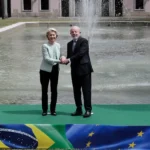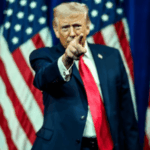
Under the noise of sanctions and commercial bravado, China consolidates real power: control of the production chains that support global capitalism
While Washington and Brussels engage in tariff disputes, technological retaliations and speeches about economic sovereignty, Beijing continues to win — not with bravado or sanctions, but with a much more effective weapon: control of global production chains.
The so-called “trade war” between the United States and China, which began under Donald Trump and gained more sophisticated contours under Joe Biden, is sold to the public as a defense of “national security” and “democratic values”. But, behind the patriotic rhetoric, what we see is a desperate attempt by the West to contain a country that, for decades, prepared itself for the clash — and that is now reaping the fruits of a long-term strategy based on production, state planning and the control of strategic raw materials.
Beijing plays the game the West invented — and wins it
The Biden administration liked to repeat the expression “small yard, high fence” when referring to restrictions on the export of advanced chips. The idea was to protect cutting-edge American technology without stifling global trade. But, in practice, the “backyard” was never small, and the fence proved to be porous. The nerve center of the new economy—semiconductors, artificial intelligence, and strategic minerals—is deeply rooted in supply chains that inevitably pass through China.
Beijing’s response was calculated: impose restrictions on the use and export of rare earths, elements essential for the manufacture of everything — from wind turbines to electric cars, from medical equipment to defense systems. The result was immediate: rising prices, production bottlenecks and entire industries in Europe and the United States on their knees, waiting for Chinese licenses.
Far from being just a commercial maneuver, this decision exposes the structural fragility of Western economies, which in recent decades have transferred their productive capacity to Asia in the name of quick profits and the “free market”. Now the spell has turned against the sorcerer.
Europe in the crossfire of neoliberal hypocrisy
The European Union, always willing to follow the American playbook, ended up being hit hard. In early October, the Dutch government took control of Chinese-owned chipmaker Nexperia under the pretext of “governance deficiencies” and technological security risks. Beijing reacted by suspending exports of chips produced in China — essential for 49% of European automakers, 86% of medical companies and 95% of the continent’s mechanical engineering sector.
In other words: in the name of “technological sovereignty”, Europe has put at risk the very industrial base that supports it. It is the paradox of European liberalism — a continent that defends “free trade” only when it serves its interests, but which now depends on a socialist country to keep its factories running.
Planning beats improvisation
While the West gets lost in electoral cycles and agendas dictated by business lobbies, China acts with a coherence that is rare in contemporary capitalism. Since 2020, President Xi Jinping has made it clear that the country’s objective was to “reduce the dependence of international production chains on China”, that is, to strengthen its autonomy without giving up control over global production flows.
The result is that, today, Beijing does not need to wage open wars or impose billion-dollar sanctions. Just tighten the flow of rare earths, delay shipments, require licenses — and the industrial world collapses. China has transformed the “just in time” logic, created by the West to maximize profits, into a tool of geopolitical pressure.
While multinationals race to adapt their supply chains, Beijing provides resources “in a trickle”, reminding everyone who truly holds the keys to the global economy.
The impasse of the declining powers
Both Washington and Brussels have not yet understood that this is not just a trade dispute, but a clash between two models of economic civilization. On the one hand, financial capitalism, driven by quarterly dividends and blind faith in the market; on the other, a State that plans, coordinates and protects its national industry with long-term objectives.
The West tries to impose “asymmetric costs” on China, but discovers that there are no measures without return. Sanctions that once worked against smaller countries now reverberate within their own borders. The economic war between the three biggest powers — the USA, China and the European Union — turns into a dispute over who can best withstand the damage. And so far, Beijing has shown a resilience that no other can imitate.
Xi Jinping does not need to worry about mid-term elections, stock market volatility or the opinion of investment funds. Western leaders, on the other hand, govern under the terror of the market — the same market they helped free from any regulation.
The silent victory
The so-called “China victory” in the trade war does not occur in triumphalist headlines or military parades. It manifests itself in the invisible dependence that paralyzes factories, the scarcity of strategic inputs and the silent panic of Western businesspeople.
The West, in trying to contain the Chinese advance, only highlighted how much its productive power has been eroded by decades of deindustrialization, privatization and submission to financial interests. China, on the contrary, demonstrated that state control over strategic sectors — so demonized by neoliberal elites — is exactly what guarantees sovereignty in times of crisis.
Ultimately, what is in dispute is not just who produces chips or who controls rare earths, but which model of society will be able to sustain the 21st century. And right now, Beijing’s socialist planning appears to be much better prepared than the liberal improvisation of Washington and Brussels.
The trade war continues, but the ideological battle is increasingly clear: between a system that plans the future and another that lives from the past. And, at least for now, the future speaks Mandarin.
Source: https://www.ocafezinho.com/2025/11/09/o-ocidente-trava-e-a-china-vence-sem-disparar-um-tiro/

